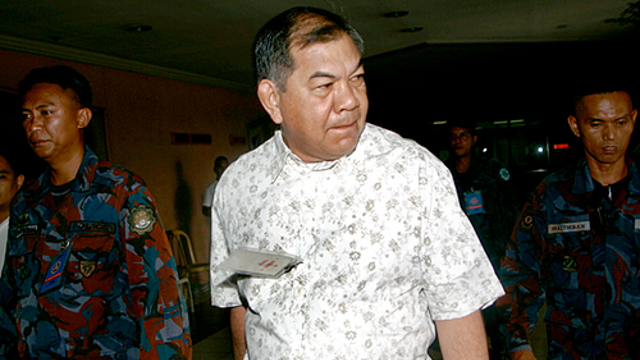SUMMARY
This is AI generated summarization, which may have errors. For context, always refer to the full article.

MANILA, Philippines – After the controversy involving former military comptroller ret Maj Gen Carlos Garcia, a senator is proposing a bill setting rules on plea bargaining agreements.
Sen Teofisto “TG” Guingona III filed the Plea Bargaining Act of 2013, which he said will set clear guidelines on plea bargain deals in criminal cases.
“Plea bargaining should not be exercises in a capricious, whimsical and arbitrary fashion. Instead, a plea bargaining agreement should ultimately redound to the benefit of the public,” Guingona said in a statement on Wednesday, July 10.
The bill requires the prosecution and the court “to inquire carefully into the circumstances and motivations on which these are premised with the paramount interest of justice and the pubic given due consideration.”
The bill sets rules on acquiring the consent of the offended party and additional parties in the case, the time of availment of the deal, and the conditions to enter into a plea bargain deal during the course of a trial.
“This bill aims to ensure that plea bargaining will not be exploited as a procedure of compromise for the convenience of the accused. Rather, [the deal] should be used for the paramount public interest of justice,” Guingona said.
Guingona filed the bill on July 1, days before the Supreme Court issued a temporary restraining order on the plea bargain deal between Garcia and the Ombudsman.
The High Court’s order stopped the implementation of the deal and the bail that Garcia was allowed to post as a result of the agreement.
The plea bargain allowed Garcia to plead to lesser offenses of direct bribery and facilitating money laundering in exchange for the dropping of plunder charges against him.
READ: Garcia: How the big fish got away
Various groups and even President Benigno Aquino III criticized the deal, which sparked the impeachment and resignation of then Ombudsman Merceditas Gutierrez.
Guingona, chairman of the Senate Blue Ribbon Committee in the 15th Congress, was among those who criticized the deal and hailed the Supreme Court order stopping it.
President’s consent required in plunder case
Under Guingona’s bill, the lesser offense in the plea bargain deal must have some of the essential elements of the original ofense charged. It shall also be under the same classification or title under the Revised Penal Code.
The bill also states that the penalty for the lesser offense should not be more than two degrees lower than the penalty for the offense charged.
In cases where there is no private offended party, the consent of the following must be obtained:
- The people of the Philippines, as represented by the prosecution,
- The government agency responsible for the enforcement of the law violated or directly affected by the offense committed, as represented by its highest ranking official like its president, chief executive or head.
In cases of plunder and money laundering, the consent of the Ombudsman and the President is required.
When a plea bargain deal is allowed
The bill also states that the accused can avail himself or herself of a plea bargain during the following times:
- At arraignment
- During the course of the trial but before the defense’s presentation of evidence.
Yet the bill set the following conditions for a plea bargain during the course of the trial. All of the following conditions must be present:
- The prosecution’s evidence is insufficient to prove the offense charged beyond reasonable doubt
- In cases involving the recovery of property in crimes against property and plunder, graft and corrupt practices, bribery and malversation, the accused must return the property or public funds involved (“a full restitution”)
- In cases of conspiracy and when the accused has not yet qualified as a state witness, the accused must fully cooperate by providing documentary, object and testimonial evidence against the principal conspirators.
Process for plea bargain deal
The bill also set a process to enter into a plea bargain deal.
If the penalty imposable for the offense is 6 years and one day imprisonment or higher or a fine exceeding P12,000, the agreement should first be approved in writing by the City Prosecutor, Provincial Prosecutor, or the Prosecutor General in criminal cases that the National Prosecution Service handles.
In criminal cases that the Office of the Special Prosecutor handles, the Ombudsman must approve the deal in writing before it is submitted to the court for approval.
The bill imposes a penalty of imprisonment ranging from 6 months and one day to 6 years, and a fine ranging from P6,000 to P60,000 for violations of the law.
Read the bill here:
– Rappler.com
Add a comment
How does this make you feel?





There are no comments yet. Add your comment to start the conversation.